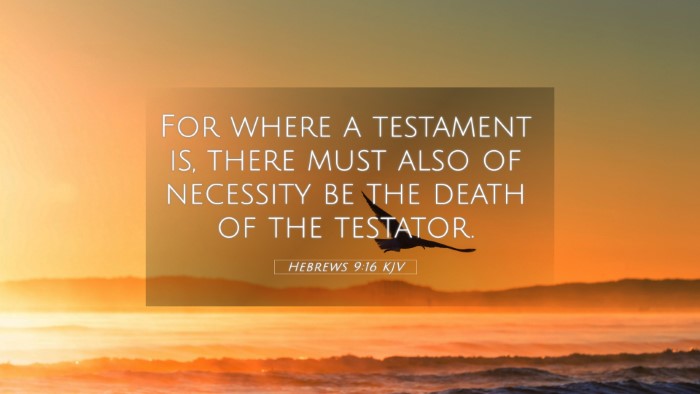Understanding Hebrews 9:16
Hebrews 9:16 states: "For where a testament is, there must also of necessity be the death of the testator." This verse is pivotal in the discussion of covenants and their effectiveness through sacrifice and death, particularly in the context of Christ as the ultimate Testator of the New Covenant.
Exploring the Meaning
The verse signifies the necessity of a death for a will or testament to be valid. In biblical terms, this relates to the Old Testament sacrificial system where the death of an animal was required for atonement for sins. The author of Hebrews uses this analogy to illustrate crucial theological truths about Christ and His sacrificial death.
- Matthew Henry's Commentary: Henry emphasizes the importance of understanding that a testament or covenant requires the death of the person who makes it effective. This underscores the significant theme of sacrificial death in both the Old and New Covenants, leading to redemption and the establishment of a new relationship with God.
- Albert Barnes' Commentary: Barnes elaborates on how the death of the testator (Christ) not only fulfills the requirement of covenant theology but also underlines the transition from the Old Covenant of animal sacrifices to the New Covenant, which is sealed by Christ’s blood.
- Adam Clarke's Commentary: Clarke connects this verse to the nature of covenants in ancient times, pointing out that they were considered binding upon the death of the testator. He stresses that this highlights the gravity of Jesus' sacrifice and the establishment of a new, lasting covenant for believers.
Key Theological Themes
This verse opens discussions about several key themes within theological study:
- The Nature of Covenants: Understanding how covenants function in biblical theology, particularly the distinction between old and new.
- Understanding Sacrifice: The significance of Christ's sacrificial death in offering redemption to humanity.
- Testament and Testamentary Themes: The relationship between the biblical concept of a testament and its implications for believers today.
Related Bible Cross-References
To fully grasp the depth of Hebrews 9:16, it’s beneficial to consider related verses that provide additional context and support.
- Luke 22:20 — "Likewise also the cup after supper, saying, This cup is the new testament in my blood, which is shed for you." This parallels the necessity of Jesus' death for the New Covenant.
- Matthew 26:28 — "For this is my blood of the new testament, which is shed for many for the remission of sins." Emphasizing the role of Jesus' blood in confirming the New Covenant.
- Hebrews 9:17 — "For a testament is of force after men are dead: otherwise it is of no strength at all while the testator liveth." This directly supports the concept established in Hebrews 9:16.
- Romans 8:3 — "For what the law could not do, in that it was weak through the flesh, God sending his own Son in the likeness of sinful flesh, and for sin, condemned sin in the flesh." This indicates the inadequacy of the Old Covenant, highlighting the necessity of Christ’s death.
- 1 Corinthians 11:25 — "After the same manner also he took the cup, when he had supped, saying, This cup is the new testament in my blood: this do ye, as oft as ye drink it, in remembrance of me." Reinforces the significance of His sacrifice in establishing the New Covenant.
- John 3:16 — "For God so loved the world, that he gave his only begotten Son, that whosoever believeth in him should not perish, but have everlasting life." This encapsulates the purpose of Christ's death.
- Hebrews 10:10 — "By the which will we are sanctified through the offering of the body of Jesus Christ once for all." This highlights the finality of Christ’s sacrifice.
- Galatians 3:15 — "Brethren, I speak after the manner of men; Though it be but a man's covenant, yet if it be confirmed, no man disannulleth, or addeth thereto." Relating human covenants to God’s covenant through Christ.
- Exodus 24:8 — "And Moses took the blood, and sprinkled it on the people, and said, Behold the blood of the covenant, which the Lord hath made with you concerning all these words." Illustrates the significance of blood in covenant making in the Old Testament.
Conclusions and Connections
Hebrews 9:16 serves as a fundamental verse linking the Old and New Testament realities of sacrifice and covenant. Through cross-referencing this verse with the associated scripture, readers gain deeper insights into God’s redemptive plan through Jesus Christ.
In studying this verse, one can appreciate how interconnected the Bible is and how various scriptures enhance understanding through thematic connections and cross-referencing. Applying tools for Bible cross-referencing, such as a Bible concordance or guide, can further enrich personal study and sermon preparation.
For further study:
- Consider the implications of Jesus’ testament in crafting new thematic connections throughout scripture.
- Identify connections between Old and New Testament teachings for a comprehensive understanding of biblical covenants.
- Explore resources on cross-referencing Bible texts and engage in studies that emphasize inter-biblical dialogue.


